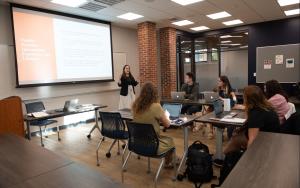Special Education M.Ed.
Offered as a Master's (M.Ed.) program
Whether you've just graduated, are working in the field, or returning to education, our Master's in Education (M.Ed.) with licensure in Special Education (ages 5-21) is the program for you. With several pathways, you can earn your master's or licensure at your own pace. You'll develop strong critical thinking skills to accommodate the needs of all students in the classroom. From elementary education to secondary education, in a general classroom or a special education setting, you'll be prepared with the tools and experience to succeed.
To view degree requirements, click the "Academic Catalog" button, navigate to "Programs by Area: Majors and Minors," and select your program.
For me, becoming a special education teacher was an opportunity to help others grow wherever they were starting from. Everyone has a gift, and everyone has something they're working on—as an educator, I wanted to help facilitate that growth in individuals.

FEATURED COURSE
Consultation and Collaboration with Families, Schools, and Communities
In this course, you'll learn effective collaboration approaches when developing a curriculum. There will be a focus on formulating a team-centered framework that provides academic support for various service delivery models, going beyond the classroom to improve students' learning experiences.
Pathways to Earn M.Ed.
1. Fellowship
For those who are licensed and received a Bachelor's Degree in Education and want to obtain a Master's Degree in Education with licensure in Special Education and interested in tuition-free Master's in Education may opt to participate in our teaching Fellowship Program. Candidates take master's courses in exchange for teaching in a partnering district. Complete full-time.*
Please Note: Graduate housing is available.
*To participate in the Fellowship Program, students must be enrolled full-time.
2. Advanced
For those who are licensed and received a bachelor's degree in education and want to obtain a Master's degree in Education with licensure in special education or only want a license in special education.
Complete full-time or part-time.
3. Initial
For those who are not licensed but received a bachelor's degree and want to obtain a Master's degree in Education with licensure in special education or only want a license in special education.
Complete full-time or part-time.
4. Professional Development
For those interested in taking courses for professional development/CEUs. Up to two courses count towards the M.Ed.
Admission Timeline
| Date | Description |
|---|---|
| December 1 | Application available. |
| February 15 | Deadline for submitting the graduate program application and supporting materials. There is a $65 application fee. |
| End of February | Decision letters sent to applicants. |
| March 15 | Deadline for accepting offer of admission to the graduate program and enroll in summer session graduate courses. |
| March | Registration and meeting with the Director of Special Education. |
FEATURED FACULTY MEMBER
Laura Wasielewski
For the past 20 years at Saint Anselm, Professor Wasielewski, Director of the Special Education Graduate Program, has made a significant impact on the Education Department.

Frequently Asked Questions
Yes! You can individualize your program of study with the Director of the Graduate Program in Special Education.
Yes, there are 4 online courses offered for the Advanced Pathway and 5 online courses offered for the Initial Pathway.
Yes, for all full-time graduate students.
The cost of the program is $575 per credit plus $18 per credit fee. There is also a registration fee for non-matriculated students. The total cost of the full master’s program is $23,000.
Note: The estimate above is based on FY25 pricing and is subject to change annually.
If students decide to pursue the Fellowship Program, then tuition costs will be covered by the school district. Additional fees may apply.
No merit aid will be available for the program. However, through the fellowship program, graduate students will receive free tuition in exchange for teaching in a partnering district for a year while completing coursework.
Course Descriptions
ED510 IEP: Ethical & Legal Influence on Educational Practices of Students with Diverse Abilities (4 credits)
This course explores the fundamental civil and legal principals and pivotal legislation that contribute to the placement, instruction, service delivery, and privacy issues of those who have a qualifying disability under federal laws. Learners will identify critical issues that may lead to ethical and legal conflicts of interdisciplinary team participants as well as proactive strategies for resolution. Furthermore, the course reviews the essential components of and development of an IEP including relevant special education law, writing measurable goals, IEP process, and aligning appropriate programming. Additionally, examination of the transition from secondary school environments to post-school activities for youth with disabilities relative to career development and self-determination is reviewed in this course. Critical components include legal foundations, functional assessment, access to career and technical education, employment, postsecondary training, and independent living.
ED520 Differentiated Curriculum and Targeted Instruction (4 credits)
The central focus of the course is to design quality specialized instruction to meet the needs of a range of learners in an inclusive classroom, as well as to leverage effective approaches and strategies to teaching and assessing students with disabilities. Data-driven instruction derived from individualized assessment results will be accessed and applied to instructional methods. Emphasis will be placed on evidence-based instructional strategies including: collaboration with service providers to best meet the academic needs of students with disabilities and Universal Design for Learning.
ED530 Positive Behavior Supports (4 credits)
This course focuses on behavioral supports and interventions to create a positive environment for teaching and learning and includes strategies for use in schools, classrooms, and with individual students. Definition of challenging behaviors, collection and analysis of data, and development of interventions to support a variety of behavior change strategies in educational settings. Emphasis is on the development of positive, problem-solving approaches and strategies for classroom management. Provides theoretical foundations and practical applications for preventing challenging behaviors.
ED540 Consultation and Collaboration with Families, Schools, and Communities (4 credits)
This course focuses on effective education-based collaboration strategies for special educators who have multiple roles and serve numerous functions when designing and implementing developmentally appropriate and challenging learning experiences for students with a disability. As the special educator job is multifaceted, additional focus is on formulating a team-centered framework that provides academic support for various service delivery models. Particular emphasis will be placed on the role of the family of the students with disabilities, understanding their backgrounds, needs, and actively engaging them in the special education process. Additionally, candidates will learn how to effectively collaborate through verbal, written, and digital communication with collaborative transition team members who enable students to meet 21st century standards post-high school completion.
Overview of consultation methods utilized by special education professionals with general education teachers, related service personnel, parents and students including the educational, legal, and ethical factors involved in case management. Impact of disability on families; collaboration with families in IEP & ITP development; Consultation with Related Services (OT, PT, SLP, APE, AB Therapist, and, collaboration with other school based supports (guidance counselors, social workers, child protective services, psychologists, etc.)
ED560 Assessment for Instructional Design and Decision Making (4 credits)
This course provides a comprehensive examination of the assessment and evaluation cycle employed within the special education process. During this course, learners will distinguish the special educator’s role within the multidisciplinary assessment process including how the evaluative data drives the planning and development of an individualized program. Additionally, the mandatory safeguards that assure ethical evaluation and assessment practices do not discriminate on the basis of race, culture, or native language are examined.
Participants focus on assessing learners with special needs, with an emphasis on measuring a learner's abilities and diagnosing his or her strengths and needs. Commonly used tests and evaluation systems used in public school special education programs are examined. Participants review guidelines and procedures for developing the individualized education program and evaluate the use of progress monitoring assessments to assess student performance. The special education referral process, the use of multi-tiered systems of support and response to intervention for assessment and remedial purposes, and basic remediation principles and strategies are also discussed.
ED600 Research Foundations and Design (4 credits)
Research Foundations and Design is the first of two required research courses. This course introduces research methodology to prepare students to design experiments, analyze data, evaluate results and report findings.
ED610 Research Capstone (4 credits)
Research capstone is the continuation and implementation of research. The course includes data analysis, research report writing, and professional presentation skills. A research project will be designed by students related to an educational setting.
ED605 Special Topics: Graduate Special Education Student Teaching (6 credits)
This student teaching experience and seminar focuses on the application of special education knowledge and skills including assistive technology in a K-12 school setting. Student teachers receive support from a college supervisor and clinical educator to meet identified special education program competencies. Each experience is arranged by the College in partnership with a district.
ED605: Special Topics: Foundations of Education and Exceptional Learners (4 credits)
This course will provide students with a foundational knowledge of theories and philosophies in education. The course will provide an overview of special education, including historical perspectives and key legal cases and laws. Emphasis will be placed on understanding the needs of exceptional learners and disability categories. The course addresses the role of the special educator in meeting the needs of students with disabilities. Students will complete 30 hours of school-based clinical experiences in special education settings.
ED605: Special Topics: Foundations and Evidence-Based Practices in Literacy (4 credits)
The central focus of the course is to provide students with the knowledge and skills needed to utilize evidence-based reading and writing instructional practices for all learners. Students will learn science-based research and best practices in the area of literacy. The course will focus on the five components of basic literacy including phonemic awareness, phonics, fluency, vocabulary and comprehension along with written language skills. Students will learn the essential principles and components needed for explicit, systematic, small group instruction to meet the needs of struggling readers/writers. Reading assignments will be based on general education standards and best practices in literacy in the classroom setting. In-class activities, case studies and lesson plans will be designed to differentiate student learning to address the needs of struggling students.
ED630 Graduate Special Education Internship (6 credits)
This internship is a field experience and seminar that focuses on the application of special education knowledge and skills including assistive technology in a K-12 school setting. Interns receive support from a college supervisor and mentor/cooperating teacher to meet identified special education program competencies. Each internship is arranged by the College in partnership with a district.
Learning Outcomes
The graduate program is designed to prepare educators to meet the needs of students with disabilities in multiple settings. After completing the Special Education Master’s Degree Program students will:
- Demonstrate an appropriate depth and breadth of understanding about the field of special education.
- Demonstrate critical thinking and ability to evaluate, understand, and communicate ideas and research.
- Demonstrate an understanding of and ability to synthesize and apply research to problems of practice through skillful inquiry.
For more information on the Special Education M.Ed. program, please contact Laura Wasielewski (603-656-6051), Director of Special Education Graduate Program.

